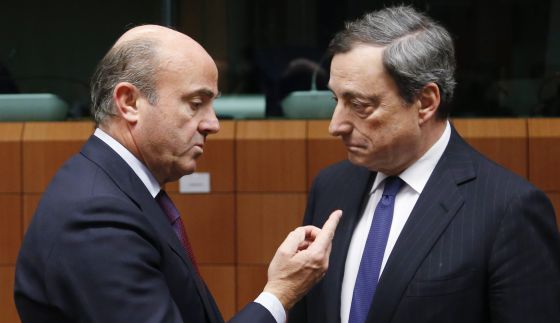
The Economy Minister Luis de Guindos, the president of the European Central Bank, Mario Draghi, in December 2013 / F. LENOIR (REUTERS)
In the shadow of the disappointing growth data Eurozone -arrastrados for discreet performance of its three major economies: Germany, France and Italy, the statistical office of the EU issued an equally alarming to the euro club data. Prices continued in July his disinflationary trend, ie, with exceptionally low (0.4%) growth. This disturbing trend fails to be translated into the dreaded deflation (prices have not yet been installed in the negative zone) but shows signs of a clear stagnation. The combination of weak growth and low inflation is one of the most terrify spirals economists and threatens to permanently extend in a eurozone can not escape comparisons with Japan nineties. Amid this situation, all re-spotlights placed on the European Central Bank and its president, Mario Draghi.
One of the first to return to speak out in favor of urgent action the ECB was the French finance minister Michel Sapin. On Thursday, as the desgranaba Eurostat data, Sapin claimed in a radio interview that the “exceptional” situation of weak growth and inflation should push to Frankfurt to act and announced in an article in the French daily Le Monde that his country will not meet its deficit target
Frankfurt can choose to wait for banking exams in October
Kenneth Rogoff, former IMF chief economist and professor at Harvard University, believes it is “highly recommended” that the ECB move quickly to revitalize inflation and deepen the insufficient depreciation of the euro-despite the ECB’s efforts since May just has depreciated by 4% against the dollar, but recognizes that the options are “limited” to the final recovery of the financial sector.
Since October 2009, when the European economy was plunged into the worst time in recent history, not as low growth in consumer prices in the euro area was recorded. The trend is negative in four of the 18 euro states and there is a record number of countries (10) in which inflation grows below 1%, the level at which the ECB President Draghi calls “danger zone”. The products that pushed prices down were the fruits and vegetables sector which presumably will be affected by agricultural sanctions approved by Russia.
Negative data are piled on the vaunted European recovery . The unacceptable level of unemployment in the periphery and high public and private debt, adds zero growth in the second quarter, a direct result of the slowdown in the major economies of the EU.
Paul de Grauwe, a professor London School of Economics, considered “urgent” coordinated action of monetary and fiscal policies, which boils down to “a more proactive ECB and European Commission to abandon its dogmatism and to bid for investment at a time of exceptionally cheap money” . And it puts the focus on the positive effect it would have on the reduction of private debt bulging of the periphery. “It’s the only way to digest it.”
Despite the growing voices of those calling delve into unconventional monetary policies, the closest to the ECB on a daily impact on the low probability that dares to throw a quantitative easing (QE), a program of asset purchases on a large scale before the year ends. Among their arguments, two stand out: first, that the ECB still believes that we must wait for the steps taken in June (rate cut to a record low, negative rate of deposit and cash bar for free banking) bear fruit. Second, which are the most orthodox majority in the governing body of the entity that holds the reins of monetary policy europea- fear that a premature move to Paris and Rome discourage compliance in the agenda of reforms promised to Brussels.
The problem is that France and Italy are not the only countries in the heart of the eurozone that care about their weak growth. Germany, European locomotive genuine sustained on its powerful foreign sector has ground to a halt in the second quarter after his good performance in the first three months of 2014 and the weight of these three economies is so significant -together account for two thirds of GDP in the eurozone, which has made sprout fears of a third recession.
the face of voices demanding quantitative measures, the director of the European think tank CEPS, Daniel Gros, believes that monetary policy has reached its limit. “The QE makes sense if the cost of financing is high, and that’s not the case in the eurozone,” he remarks. According to Gros, another factor that could make a difference is a weaker euro. “But the ECB will resist undertake direct currency intervention” notes. As Gros, Rogoff also believes that Draghi will not intervene for now and wait until get their hands on resistance testing banking October, on which it bases its hopes of revitalizing the banking sector and hence multiplication the effectiveness of monetary policy. “It seems reluctant to act until then,” he concludes.
No comments:
Post a Comment